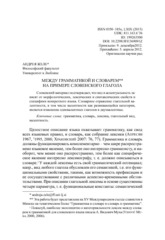Приказ основних података о документу
Between grammar and dictionary: With special reference to Slovene verb
Между грамматикой и словарем - на примере словенского глагола
| dc.creator | Žele, Andreja | |
| dc.date.accessioned | 2018-05-19T18:16:01Z | |
| dc.date.available | 2018-05-19T18:16:01Z | |
| dc.date.issued | 2013 | |
| dc.identifier.issn | 0350-185X | |
| dc.identifier.uri | https://dais.sanu.ac.rs/123456789/2996 | |
| dc.description.abstract | Slovene resources confirm that verbal aspect and aspectualness depend on the morphological, lexical, syntactic, and other characteristics of a particular language. Since verbal aspect is directly connected to the meaning of a particular verb, as well as its structural and semantic-syntactic abilities, it is considered to be an essential characteristic in terms of the language system of every language. The specific features of aspectualness, especially if we take into account its connectedness to a given language system, are confirmed by various contrastive studies, which also place considerable emphasis on a number of general aspectual characteristics that can be applied to all languages. Within every language system, for example, the grammatical (morphological), lexical, and syntactic aspectualness are distinguished from one another, whereas in the case of a particular text, the relationship between aspect, time, and mood cannot be overlooked. What remains central in both current and future discussions is establishing the relationship between aspectualness and temporality within a particular language or languages. Cases of 'aspectual competitiveness', related to the temporal structure of a given sentence, have been noted in Slovene as well, especially in examples like Sem že večerjal - Sem že povečerjal ('I already had dinner - I already finished my dinner'), Vedno smo k obstoječemu doprinesli tudi nekaj novega - Vedno smo k obstoječemu doprinašali tudi nekaj novega ('We always contributed something new to the existing condition - We always used to contribute something new to the existing condition'), etc. That the behavior of the imperfect may vary in the past and future is shown by examples like Temperatura se je dvigovala 'višala, padala in spet višala' (The temperature kept rising 'rising, falling, and rising again'), Temperatura se bo dvigovala 'vedno samo navzgor, brez nihanja' (The temperature will keep on rising 'it will rise without falling'). It is also important how a particular dictionary presents verbal valency as a developmental category. The most common is the change from monovalent verbs to bivalent or governed verbs. When considering the valency of non-deverbal nouns and adjectives, it must be noted that especially in the case of nondeverbal adjectives, valency is the consequence of the dynamic meaning of semantically similar verbs, which can replace non-deverbal adjectives in a particular sentence. | en |
| dc.rights | openAccess | |
| dc.rights.uri | https://creativecommons.org/licenses/by-nc-nd/4.0/ | |
| dc.source | Јужнословенски филолог | |
| dc.subject | grammar | en |
| dc.subject | dictionary | en |
| dc.subject | lexicology | en |
| dc.subject | aspect | en |
| dc.subject | valency | en |
| dc.title | Between grammar and dictionary: With special reference to Slovene verb | en |
| dc.title | Между грамматикой и словарем - на примере словенского глагола | RUS |
| dc.type | article | |
| dc.rights.license | BY-NC-ND | |
| dcterms.abstract | Желе, Aндреја; Meždu grammatikoй i slovarem - na primere slovenskogo glagola; | |
| dc.citation.spage | 91 | |
| dc.citation.epage | 114 | |
| dc.citation.issue | 69 | |
| dc.identifier.doi | 10.2298/JFI1369091Z | |
| dc.type.version | publishedVersion | |
| dc.identifier.fulltext | https://dais.sanu.ac.rs/bitstream/id/20732/3074.pdf | |
| dc.citation.other | (69): 91-114 | |
| dc.identifier.rcub | https://hdl.handle.net/21.15107/rcub_dais_2996 |
Документи
Овај документ се појављује у следећим колекцијама
-
Јужнословенски филолог / Južnoslovenski filolog
ISSN 0350-185X; eISSN 2406-0763

